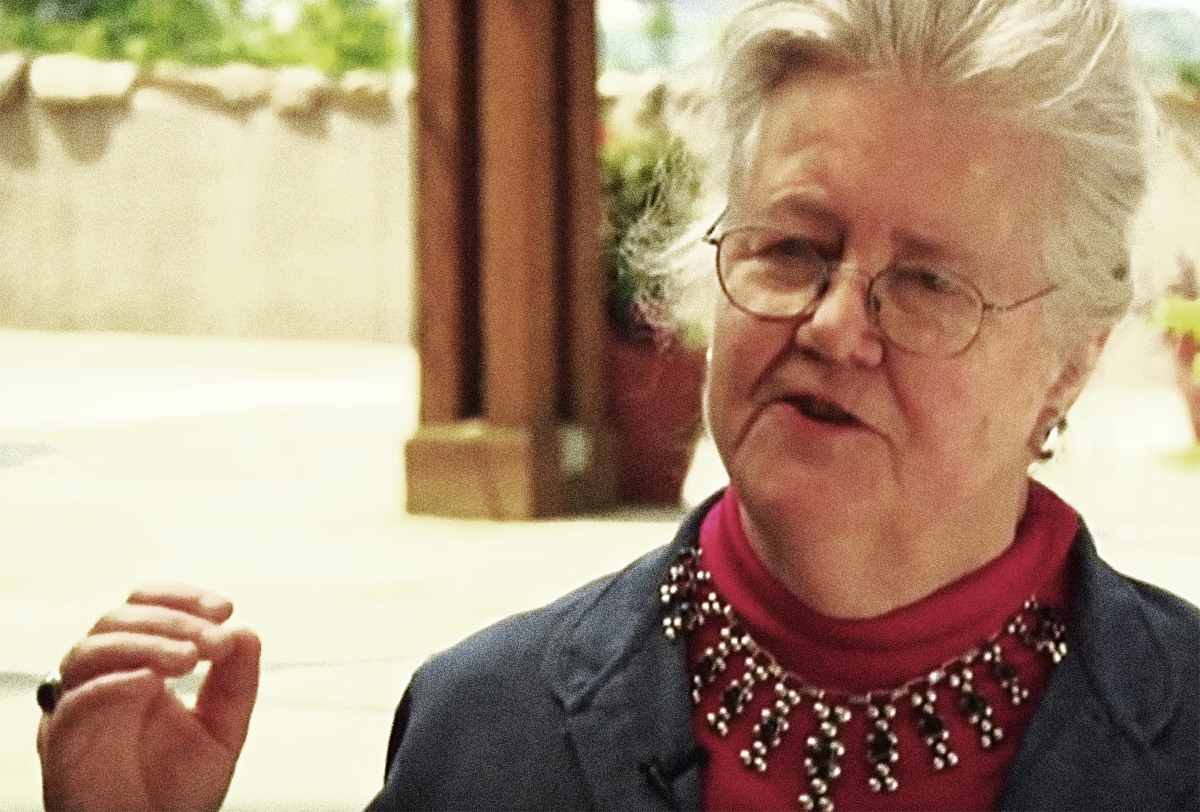Politics
Red Sheep
An impressive new biography of Jessica Mitford emphasises her sceptical and anti-authoritarian personality. But this was only half of the picture.

A review of Troublemaker: The Fierce, Unruly Life of Jessica Mitford by Carla Kaplan, 592 pages, Hurst (December 2025)
In this first-rate biography, American literature professor Carla Kaplan re-examines the life of Jessica Mitford, a young woman born into wealth and privilege who traded her aristocratic position for communist politics. Throughout her account of Mitford’s eventful life, Kaplan emphasises her subject’s sceptical and anti-authoritarian personality. But this was only half of the picture.
Jessica Lucy “Decca” Mitford (1917–96) was sister to Nancy, Deborah, Tom, Diana, Unity, and Pamela—the sixth of seven children born to British peer David Freeman Mitford and his wife Sydney. The parents were as eccentric as their children would turn out to be. David didn’t want women in parliament because he feared they would use the restroom and he kept a pet mongoose. Sydney was terrified of doctors (she poured all medicine down the sink) and refrigeration. Both hated formal education, which David—according to Kaplan—believed would “thicken his daughters’ ankles,” while Sydney worried that the company of other children would be “overstimulating.” This caused Decca great resentment. “The thing that absolutely burned into my soul,” she would later write, “was the business of not being allowed to go to school.”
Sydney Mitford’s mode of homeschooling consisted of reading aloud to her children and then quizzing them about what they had just been told. So, the six Mitford girls and their brother led a cloistered life on their parents’ 20,000-acre estate with a retinue of cooks, maids, and gardeners. “It was neither necessary, nor generally possible,” Decca reflected later, “to leave the premises for any of the normal human pursuits.” Neglected by their parents, the siblings developed their own code, which they often used to tell dirty jokes in front of adults. This ungoverned group of children—referred to by one observer as “a savage little tribe”—were so unruly that governesses and tutors would often flee the estate in tears.
Kaplan describes the world the children created in the estate’s adult-free library: “They spent almost all their time there, reading, inventing games, playing piano … so the children lived a world apart, and they took advantage of that freedom to invent their own society of rules, rank, games, languages, pranks, cruelties and occasional kindnesses.” This insularity was further fed by their father’s racism and misanthropy. As Decca wrote in 1960:
According to my father, outsiders included not only Huns, Frogs, Americans, blacks and all other foreigners, but also other people’s children, the majority of my older sisters’ acquaintances, almost all young men—in fact, the whole teeming population of the earth’s surface, except for some, though not all, of our relations and a very few tweeded, red-faced country neighbours to whom my father had for some reason taken a liking. In a way, he was not “prejudiced” in the modern sense. Since the thirties, this term has come to mean the focusing of passionate hatred against a selected race or creed; the word “discrimination” has even become almost synonymous with prejudice. My father did not “discriminate”; in fact he was in general unaware of distinctions between different kinds of foreigners.
Her father also harboured what she described as “a sort of innate antisemitism,” and this hatred filtered down to two of his daughters (Unity and Diana) and to his only son (Tom) in a more pronounced form. Even her mother supported Hitler (“Nazism,” Sydney said, “is from every point of view preferable to communism.”) Tom became an ardent Hitler sympathiser who elected to serve in the Pacific theatre during World War Two so that he wouldn’t have to fight Nazi Germany. Diana divorced her rich husband to marry Oswald Mosley, leader of the British Union of Fascists, and she would go on to be a lifelong fascist (the couple were married at the home of Joseph Goebbels and Hitler was a wedding guest). And from a young age, Decca’s favourite sister Unity declared that she was going to “Germany to meet Hitler.”
Decca resisted this draw and countered that she was “going to run away and be a Communist.” She knew that she and her “adored” sister would fulfil these goals and that this would separate them: “I had a sad and uneasy feeling that we were somehow being swept apart by a huge tidal wave of which we had no control, that from a distance a freezing shadow was approaching which would one day engulf us.” As it turned out, Unity did more than merely meet Hitler; she became so close to him that she tried to kill herself when war broke out between Britain and Germany in 1939.
By the age of twelve, Decca had developed a social conscience from observing poverty in the nearby village. She experienced “vivid glimpses of the real meaning of poverty, hunger, cold, cruelty” and was frustrated by her “inability to discover a solution.” And this, along with the isolation she felt within her family’s estate, led her to plot an escape by opening a bank account that she called her “running away account.” She eventually determined that class was the key to “everything” and that class lines were immutable: “upper class, middle class, and working class were destined to travel forever harmoniously down through the ages on parallel tracks which could never meet or cross.” In defiance of this law, Decca jumped her tracks and began to fight a “lonely opposition” against “everything the family stood for.”
Kaplan believes the family misread Decca’s rebellion as a manifestation of “teenage angst” and missed the point of what motivated her flight. Unlike her “rightwing siblings” and her “quirky, distant, and unloving parents,” Decca was enraged by “the inequalities they all accepted.” As a consequence, she was radicalised and became authentically left-wing. Ironically, the avenue for her departure from the family fold would be provided by her father’s attempts to prepare his daughters for marriage.
Esmond Romilly was the radical nephew of Winston Churchill, and he was already a Spanish Civil War veteran by the time he met Decca in 1937. Romilly was only one of two survivors of his brigade and was invalided home after he contracted dysentery. Decca had been in love with him for years, so she withdrew the running-away money she had accrued and the pair eloped to Spain, which was then still in the throes of its Civil War. Kaplan characterises their flight as a madcap episode, and the couple were pursued by detectives employed by her father tasked with returning the family’s “red sheep.” The family even successfully prevailed on the British government to send out a destroyer bearing Decca’s older sister Nancy to retrieve Decca.

In the teeth of her family’s bitter opposition, Decca and Romilly were married in the French city of Bayonne near the Spanish border in May 1937. The plan was for Romilly to take a job in Spain as a war correspondent while Decca played the dutiful wife (feminism was never her strong suit). According to Kaplan, “It was for Esmond to establish their views and decide on their actions—for Decca to cheer him on and to look after the house.” Unlike her husband (who once described himself as a Bolshevik), her politics were still “only on the threshold.”
Unable to obtain visas for Spain, the couple returned to London from Bayonne later that year. Tragedy would strike when the couple’s baby died during a measles outbreak in May 1938, but Decca never spoke of it. Rather than grieve, she threw herself into aiding her husband: “[Esmond] never doubted that in the long run I would do anything he wanted to do,” she recalled. They moved to the United States and settled in Greenwich Village, where they eked out a living. Decca modelled dresses and Romilly worked in advertising. Then in 1941, Romilly enlisted in the Canadian air force and he and his crew were lost at sea that November following a bombing mission.
Kaplan convincingly argues that Decca was transformed by her husband’s death:
[It] steeled rather than shattered her. Almost overnight, the young forward-looking, frivolous optimist became a bold, driven pragmatist. The young woman who spent her life following orders became fiercely self-directed. Confidence replaced uncertainty.
Decca shared Romilly’s optimistic belief that the war would become “a world revolution against all forms of oppression, sweeping capitalism into the dustbin of history.” The war itself was a “noble cause” worthy of devotion, and those who supported Hitler—her siblings included—deserved to be executed. She rejected Churchill’s offer to make her imprisoned sister Diana more comfortable, stating that Diana ought to die for supporting the forces that had killed her beloved Esmond.
From here, Kaplan organises her narrative around the journey that led Decca to become the muckraking investigative journalist responsible for The American Way of Death in 1963, a blistering exposé of how greedy funeral directors bilked grieving people. Her aristocratic upbringing gave her the charm to get interviewees to open up. And having been further radicalised by her husband’s death, she honed her research skills as a worker in the Office of Price Administration in wartime Washington, DC. She held the line, Kaplan reports, “against war profiteers, price gougers, greedy landlords, violators of rationing regulations,” and she believed the OPA was “as close to the front line of the war against Fascism as anything in Washington.”
During this period, Decca finally obtained the education she had been denied in her youth from the Communist Party-sponsored Labor School where she studied labour theory, music, and fine arts. Kaplan argues that Decca was always at her best when she was pitted against “formidable enemies,” and the book offers a superb account of her work against racism, vividly recreating just how nasty Southern (and Northern) whites could be when mobbed up against the Civil Rights movement. Kaplan also provides a compelling picture of the courage required for people like Decca to resist them, on one occasion racing into one of these mobs. On another occasion, she huddled with Martin Luther King Jr. as an angry crowd pounded on the door of the church in which they were sheltering.
However, although Kaplan’s book is splendid in many ways, it stumbles somewhat in the sections dealing with Decca’s time as a member of the Communist Party, which she and her second husband Bob Treuhaft joined in 1943. She also said nothing about Stalin’s refusal to support the Polish Home Army uprising in 1944 until the Nazis had murdered those he believed were also his own potential enemies. Kaplan mentions that Decca did not like how the Communist Party became less revolutionary under the leadership of Earl Browder, who attempted to liberalise the organisation. But Kaplan doesn’t mention that Browder was kicked out of the Party on Stalin’s orders, which were communicated to the US branch by French communist Jacques Duclos. The new CPUSA head William Z. Foster was much more hardline, calling for class war in the United States.
Kaplan notes that the Browder episode gave Decca a chance to prove her loyalty, but she doesn’t explain that this entailed the Stalinisation of the Party. Moreover, while Kaplan salutes Decca’s loyalty to her preferred political cause, she does not acknowledge that this conflicted with Decca’s supposedly “core value” of anti-authoritarianism that Kaplan praises elsewhere. As Decca wrote in her 1977 autobiography, A Fine Old Conflict: “I had regarded joining the Party as one of the most important decisions of my adult life. I loved and admired the people in it, and was more than willing to accept the leadership of those far more experienced than I.”
Decca did eventually become aware that she had been duped by the Party, but it took her longer than many of her fellow radicals and she never acknowledged just how wrong she had been. During a state-managed 1955 trip to communist Hungary, Decca and Treuhaft allowed themselves to be persuaded that Hungary was a socialist success. The experience of being there, both agreed, was “exhilarating.” Confronted by two workers who knew the reality of the Hungarian dictatorship, the pair refused to engage them in conversation. In this instance, Kaplan rightly characterises their article praising the communist satellite as “inaccurate” and “embarrassing”:
While the Hungarians against Stalinist policies would not become a forceful movement for another year, in 1955 there were indications of the revolution to come throughout Hungarian society and especially from workers. She and Bob had missed all the signs.
Amazingly, Decca and her husband remained Party members even after Nikita Khrushchev’s secret speech in 1956 detailing the atrocities of Stalin. News of the speech caused mass defections from the CPUSA, but Decca hoped that it indicated the Soviets were moving in a more open, transparent, and democratic direction. “I didn’t join the exodus,” she said of this time period. Her explanations for keeping the faith were desperate. She allowed that Stalin’s crimes were “grisly,” but “the very fact that Khrushchev had seen fit to lay them out for all the world to see [proved] that untrammeled critical reexamination” would result in “a new dawn for an indigenous, American-style revolutionary movement led by the Party.”

Decca would remain a member of the Communist Party until 1958. She only left when she realised that it would remain in “the hidebound, orthodox leadership of past decades.” But breaking with the Party publicly, her husband worried, would be like “red-baiting,” so the couple left quietly. According to Kaplan, they found the “participatory democracy” of the New Left more attractive than the Party’s “centralized authoritarian organizations.”
Nearly two decades later, Decca was still protective of the Party. She told readers of her 1977 memoir that it had been written for political reasons, “to lay to rest some of the myths created by the ‘I-Was-Duped’ school of American ex-Party members.” The Party, she explained, left a “heritage” for “all future radical movements,” and without it, revolutionary change would not have been possible. And to those future generations of revolutionaries, she wanted to convey “the fascinations, difficulties and frequent joys” of belonging to a revolutionary organisation.
Decca Mitford emerges from Kaplan’s compelling biography as a complex figure of familiar contradictions—an eccentric and privileged personality who rebelled against her family’s wealth and authoritarianism by throwing herself into the arms of a totalitarian mass movement. There are, as the saying goes, many such cases.
Correction: An earlier version of this essay incorrectly stated that Stalin did not intervene to support the Warsaw Ghetto Uprising in 1943. In fact, it was the Warsaw Uprising against the Nazis in 1944 that he refused to assist. Quillette regrets the error.






